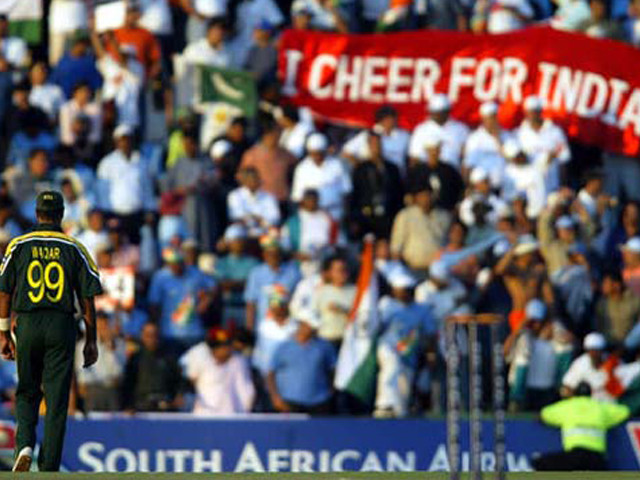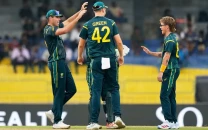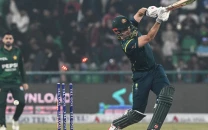2003 — Australia pummel the world
Before the 2003 World Cup, Steve Waugh handed the reinss to the prodigiously gifted Tasmanian Ricky Ponting.

A SAD EXIT: Waqar’s illustrious career came to a sudden end after Pakistan crashed out of the 2003 World Cup in the opening round as his partner in crime Wasim also left the game after the early exit. PHOTO: REUTERS
Before the 2003 edition of the World Cup, Steve Waugh had handed the reins of his world beaters to the prodigiously gifted Tasmanian Ricky Ponting.
Australia had turned into a ruthless unit — decimating opposition generally comprising of mere mortals compared to the Aussies. An unbeaten 16-Test match streak, that lasted nearly two years on the back of the 1999 World Cup triumph, confirmed the obvious.
But a bombshell was dropped on Ponting’s team just days before the start of the first ever World Cup in South Africa when the incomparable Shane Warne was sent packing after the star leg-spinner had tested positive for the drugs hydrochlorothiazide and amiloride.
The two diuretics normally used to aid temporary weight loss could also be used as masking agents for performance-enhancing drugs, and were hence barred in cricket.
Warne’s wish of repeating his 1999 semi-final and final heroics was dealt a crushing blow as he was banned for one year, with the Victorian claiming he was ‘shocked and devastated’.
Ponting and the canny John Buchanan, the Australian coach, remained undeterred and rallied their team around, stressing that even without Warne the team possessed the ammunition of retaining the coveted prize.
After a jittery start in repeat of the 1999 World Cup final against Pakistan at Lord’s, the Australians unearthed a new gem in Andrew Symonds. The right-hander turned the game on its head after the loss of four early wickets, tearing into a world-class bowling line-up in an astonishing 143-run unbeaten blitz.
After a streak of bruising wins against India, Holland, Namibia and Zimbabwe, the Aussies came across fired-up English team at Port Elizabeth. After Symonds, another unsung hero Andy Bichel chose to make a spell-binding impact on the game.
Bichel bowled with unerring accuracy in a remarkable seven-wicket performance on a sluggish wicket. In reply, the chase had completely derailed after Brett Lee’s departure. With 135 runs on board and only two wickets left in the kitty, Bichel joined hands with Michael Bevan, arguably the greatest ODI finisher of all time.
The grit in the Australian ranks was on show for the umpteenth time as the duo added 73 in their unbroken alliance to steer their team home; surely no situation or predicament was beyond the Aussies reach.
In the Super Six stage, Ponting’s men hammered Sri Lanka, New Zealand and Kenya to book their place in the semi-finals. In the game against the Black Caps, the searing pace of Shane Bond threatened to conquer their Antipodean rivals, but Brett Lee had other ideas.
Lee matched Bond’s six-wicket feat with a five-wicket burst delivered through some searing thunderbolts that threatened to outdo Shoaib Akhtar’s 100-mile delivery to Nick Knight earlier in the tournament.
After brushing aside Sri Lanka in the semi-finals, Ponting’s team lined up against a progressively confident Indian team under Sourav Ganguly in the ultimate showdown at Johannesburg’s Bullring.
The final started at a helter-skelter pace. Matthew Hayden and Adam Gilchrist laid the foundations of a big total through a 105-run opening stand, after which both perished in quick succession, leaving the stage for Ponting’s finest hour in the ODI format.
In less than two hours, Ponting and Damien Martyn – nursing a broken thumb – bulldozed the Indian attack through an unbroken 234-run stand for the third wicket. Ponting joined the upper echelon of the greats courtesy of an innings of 140 – the then biggest innings in a World Cup final.
A target of 360 was well beyond Sachin Tendulkar and his mates and when Darren Lehmann caught Zaheer Khan, Australia had knocked everyone else off the pedestal for the second successive time in the World Cup.
An aging Pakistan team’s disgraceful exit
The 2003 World Cup was a supposed shot at redemption for the likes of Wasim Akram, Waqar Younis, Saeed Anwar, Inzamamul Haq, Rashid Latif, Shoaib Akhtar and Saqlain Mushtaq; the Wasim-led ‘hot favourites’ had crashed out woefully in the 1999 final at Lord’s. Waqar was seeking to bury the demons of the Jadeja assault in the 1996 quarter-final at Bangalore.
Captaining the team in the tournament against popular opinion, Waqar’s 2003 contenders resembled a fractured unit even in the presence of stalwarts.
For the first time since the inaugural World Cup edition of 1975, a Pakistan team failed to make it to the knock-out stage of the tournament. Bunched with Australia, India and England, Pakistan had a tough road to the Super Six stage.
But the die-hard fans had hoped of a passage through especially with the wealth of experience in the outfit.
After a hammering against Australia, Pakistan blew away Namibia. But in the crucial game against England at Cape Town, the moving ball under lights wreaked havoc with the mercurial batting line-up. Holland were countered without much fuss at Paarl as the men in green prepared for the virtually do-or-die clash against India.
At Centurion, Saeed Anwar’s ton helped post a more than fighting score of 273, giving some real hope to the Pakistan camp.
The combative duo of Tendulkar and Virender Sehwag then went out all guns blazing, adding 53 inside six overs. Waqar struck twice in successive deliveries to send back Sehwag and Ganguly (Waqar’s last two international wickets), but Tendulkar kept tonking the bowlers.
The maestro eventually fell on 98 fending off an Akhtar bouncer to Younus Khan, but his wicket didn’t open the doors Pakistan had expected. Rahul Dravid and Yuvraj Singh took their team past the target, drawing curtains on the stellar careers of Wasim, Waqar and Anwar.
Pakistan lined up against Zimbabwe in Bulawayo with only a monumental win offering a semblance of a chance of qualifying for Super Sixes, but rain washed away the game after only 14 overs.
The 1992 champions had fallen without a whimper.
Like Sports on Facebook, follow @ETribuneSports on Twitter to stay informed and join in the conversation.



















COMMENTS
Comments are moderated and generally will be posted if they are on-topic and not abusive.
For more information, please see our Comments FAQ